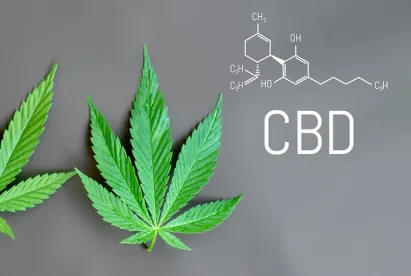As the CBD boom continues to gain a foothold in mainstream commerce, the Food and Drug Administration (FDA) has been slow to provide retailers and consumers with meaningful guidance or regulation.
On December 20, 2019—in response to prompting from Senate Majority Leader McConnell for FDA guidance on CBD regulation— the Further Consolidated Appropriations Act (the “Act”) (P.L. 116-94), was passed. The Act required the FDA to provide a report regarding its progress towards developing a policy for enforcement and use of CBD as an FDA-regulated product (the “Report”).
The Report—along with a public press release—was issued on March 5, 2020. While many CBD industry participants hoped the Report would provide substantive guidelines for safe manufacturing and distribution practices and approved uses, the Report lacked significant guidance. Indeed, the Report largely reasserts the position the FDA has taken in the more than 50 warning letters issued to CBD companies since 2015—namely, that CBD poses health risks, is not an approved drug, dietary supplement or food additive, and that retailers and manufacturers are not permitted to make unsubstantiated claims regarding the health benefits of these products.
While public safety and lack of definitive science continues to remain a top concern, the main take-away from the Report is that the FDA is seriously considering “potential pathways for certain CBD products to be marketed as dietary supplements.” Specifically, the Report notes the “FDA has the authority to create an exemption through notice-and-comment rulemaking [] that would allow products containing CBD to be sold legally as dietary supplements.” While the rulemaking procedures contemplated are notoriously time intensive, the fact that the FDA has unveiled a strategy for working toward regulation is considerable forward progress.
The path for the use of CBD as a food ingredient remains less clear. The FDA reiterated that “[i]t is not currently lawful to add CBD to human or animal food.” However, the FDA remains open to changing its position as it continues to “encourage interested parties to continue to develop and share with the FDA information regarding whether there are conditions under which CBD could safely be added to food.”
While understandably anxious consumers and retailers must continue to wait for more definitive regulation and guidance, the Report is an encouraging sign that the FDA remains committed to creating a workable regulatory framework for the safe sale and consumption of CBD products. The Report acknowledges, for example, the “incredible amount of interest in CBD across a wide range of product areas” and the “significant interest in the development of therapies and other consumer products derived from cannabis and its components, including CBD.” The FDA also confirmed it is “excited about potential new therapeutic uses for CBD that may be substantiated through further clinical study, as we are committed to doing all we can to encourage the development of CBD drug products and additional cannabis-derived drug products through existing, legal pathways.”
Until comprehensive guidance is available, manufacturers and retailers should continue to act conservatively and carefully by avoiding advertising claims related to health benefits. Stakeholders with scientific research on CBD’s health effects should also consider working with regulators by providing them with data needed to evaluate and approve CBD as an FDA regulated product.




 />i
/>i
